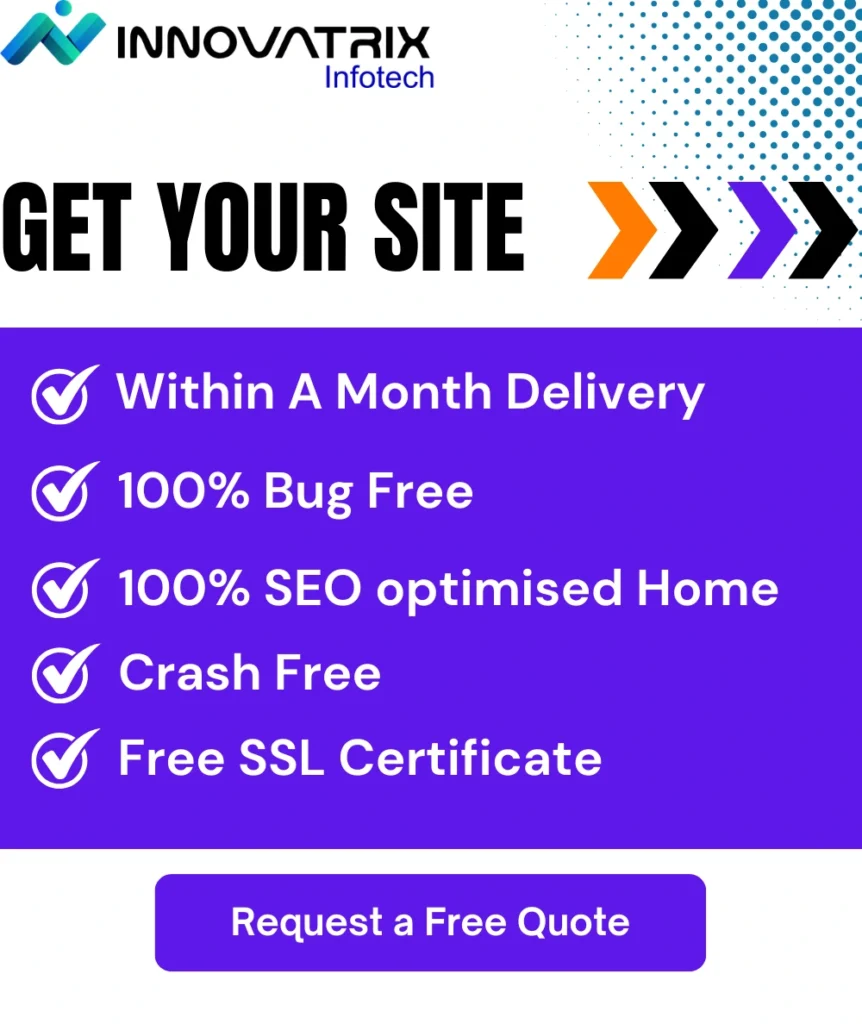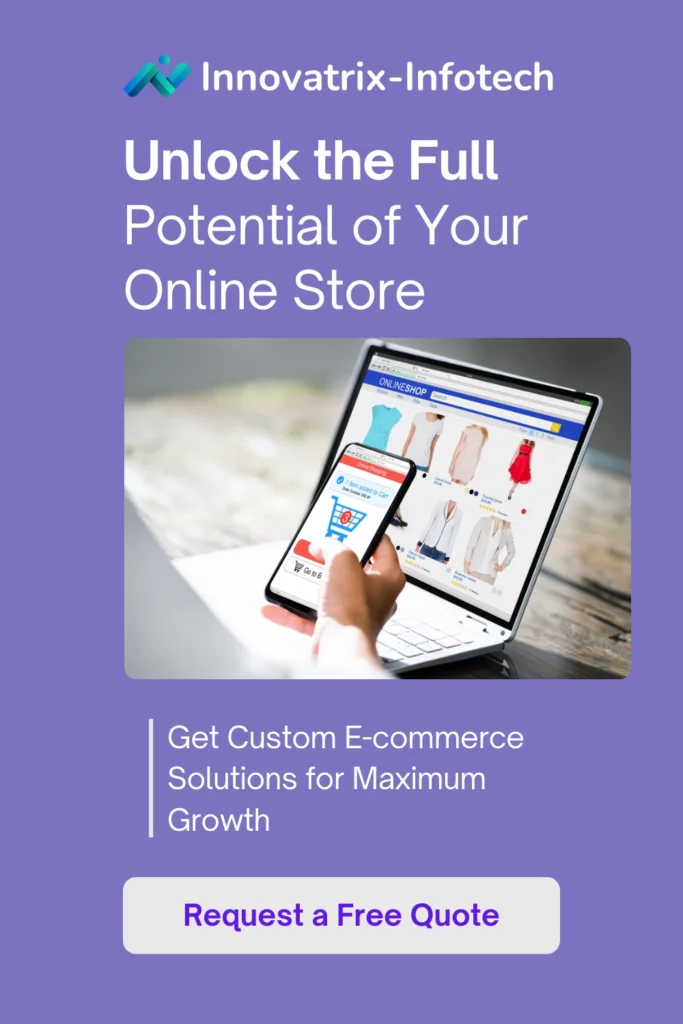What is E-commerce Development and Why Does Your Business Need It?
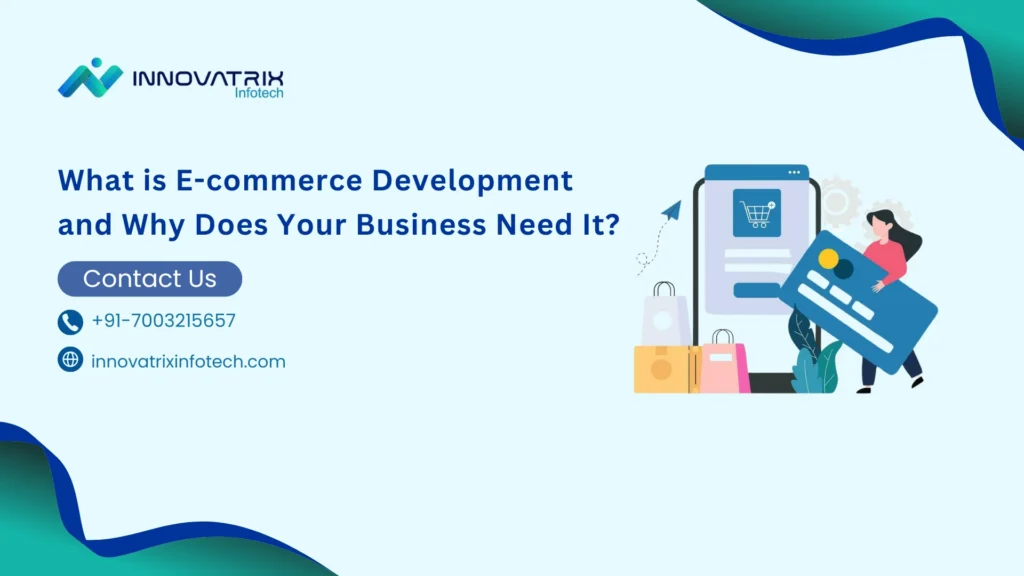
E-commerce development is a place where a business meets its digital recognition, thus growing into a thriving and intuitive business globally!
E-commerce is the decision-maker of the digital world! Everything is done through e-commerce platforms, from booking cabs via Uber and waiting for the Big Billion Days Sale to using a coupon code for flight booking through IXIGO. The future of e-commerce development is bright as every business owner is now shifting from conventional business tactics. Today, the primary aim is to create a presence online and grow across multiple avenues beyond geographical barriers. According to statistics, by 2026, the e-commerce marketplace will increase by USD 8.1 trillion. Moreover, compound annual growth rate (CAGR) will increase by 14.7% in 2027.
E-commerce is the magnetic giant these days. The pace of development is consistently evolving. Online businesses are blooming due to the immense choices available to customers. For instance, a small-scale business owner who sells pickles wants to expand his business across India. At that moment, the e-commerce platform will act as a gateway to entering the digital market. Once the pickle seller gets online recognition, the domain of his financial growth advances.
In this blog, we will discuss the features of e-commerce development, its various forms, how it boosts the economic dividend, customer experiences, and more. We will evaluate how e-commerce is leading to a three-dimensional shift in the business arena and how it empowers business owners.
What is E-commerce Development?
E-commerce is known as an electronic medium to shape the business online with access to a wider section of society. Commercial growth through digital marketplaces is e-commerce. Popular e-commerce platforms are Amazon, Flipkart, Myntra, Zomato, etc.
Understanding E-commerce Development
E-commerce development refers to the significant process of building and managing online platforms to sustain the buying and selling of products and services online. E-commerce offers flexibility and convenience, which are the major reasons for the large-scale acceptance of online business.
Prominent features of e-commerce include smooth launch and feasibility for business owners of any age group.
For example, Rukmini is a business owner in rural India who sells hand-knitted sweaters. However, she couldn’t sell beyond the village’s territory due to a geographical barrier. Then, her son taught her about e-commerce platforms. He made her accustomed to the benefits of digital presence, so she decided to develop her e-commerce store to sell hand-woven yarns. Thus, the development of her online store for knitting yarn changed her life tremendously.
E-commerce development not only accelerates finances but also transforms the spectrum of customer engagements. Let’s examine the key elements of e-commerce development.
Website design and structure
Website design and structure are core elements of e-commerce development. The customer-friendly e-commerce website design allows users to have a seamless shopping experience. The website’s infrastructure comprises products, categories, checkout options, etc.
Back-end Development
Back-end development encompasses setting up databases and servers. It contains information about products, user accounts, and payment gateways. A robust back-end can handle high traffic and boost the website’s performance.
Payment Gateways
The e-commerce platform offers online services that require online payment gateways. Secured and seamless transactions build trust and loyalty among customers. Popular online payment gateways include Square, Paypal, etc.
Security Protocols
The privacy and security of customers are necessary to enhance users’ credibility. End-to-end encryption not only secures the user’s data but also boosts authenticity. Thus, secured transactions protect the user from fraud and cyber attacks.
Integration with Third-Party Systems
Efficient integration with Third-Party systems is the primary component of e-commerce websites. It enables connection with other authentic software such as CRM (Customer Relationship Management) systems, ERP (Enterprise Resource Planning), etc. Hence, it bolsters smooth operations and enhances customer interactions.
Efficient integration with Third-Party systems is the primary component of e-commerce websites. It enables connection with other authentic software such as CRM (Customer Relationship Management) systems, ERP (Enterprise Resource Planning), etc. Hence, it bolsters smooth operations and enhances customer interactions.
Different Types of E-commerce Models
B2B (Business to Business)
In the domain of B2B e-commerce development, trade is conducted between businesses to businesses. Wholesalers sell products and services to retailers. Hence, the transaction is between the business owners.
B2C (Business to Consumer)
The popularly used e-commerce model is B2C e-commerce solutions where business owners directly sell to consumers. There is no intermediary available in this e-commerce development model.
B2C (Business to Consumer)
The popularly used e-commerce model is B2C e-commerce solutions where business owners directly sell to consumers. There is no intermediary available in this e-commerce development model.
C2C (Consumer to Consumer)
E-commerce platform where consumers sell products and services to consumers. Amazon, Etsy, Craigslist, and other popular e-commerce platforms that offer C2C solutions.
D2C (Direct to Consumer)
The e-commerce model in which products and services are directly sold to consumers is called D2C. In this model, mediators are also absent, enhancing brand recognition on a global scale. This is particularly true for niche-based businesses.
Popular E-commerce Platforms
Shopify
Shopify is a well-known e-commerce platform that helps small and medium-sized businesses to create online shopping websites. It integrates multiple social networking sites, product posting, cart options, and secure online payment gateways.
WooCommerce
WooCommerce is a plugin for WordPress websites that helps with the customization of e-commerce business websites. The flexibility WooCommerce offers is helpful in online store development.
Magento
Magento is a popular e-commerce platform that helps retailers develop online stores. Its robust development makes it a top choice for building e-commerce platforms. Magento’s technical advancements are immense, enhancing its scalability.
BigCommerce
BigCommerce offers multi-channel selling opportunities. It is beneficial for enterprises eager to expand quickly beyond the horizon. BigCommerce’s ultimate aim is to grow and develop digitally with ease.
Q-Commerce
Q-commerce (Quick Commerce) is the quickest mode of on-demand delivery of orders. The time-frame for delivering items via quick commerce is around 30-45 minutes and it is maximum one hour. It is helpful for small items that are in high demand. The aim of quick commerce is convenience and affordability.
E-commerce platforms streamline the pathway for managing businesses online. It not only enhances online recognition but also boosts the economic dividend of businesses through online mode.
Why Your Business Needs E-commerce Development
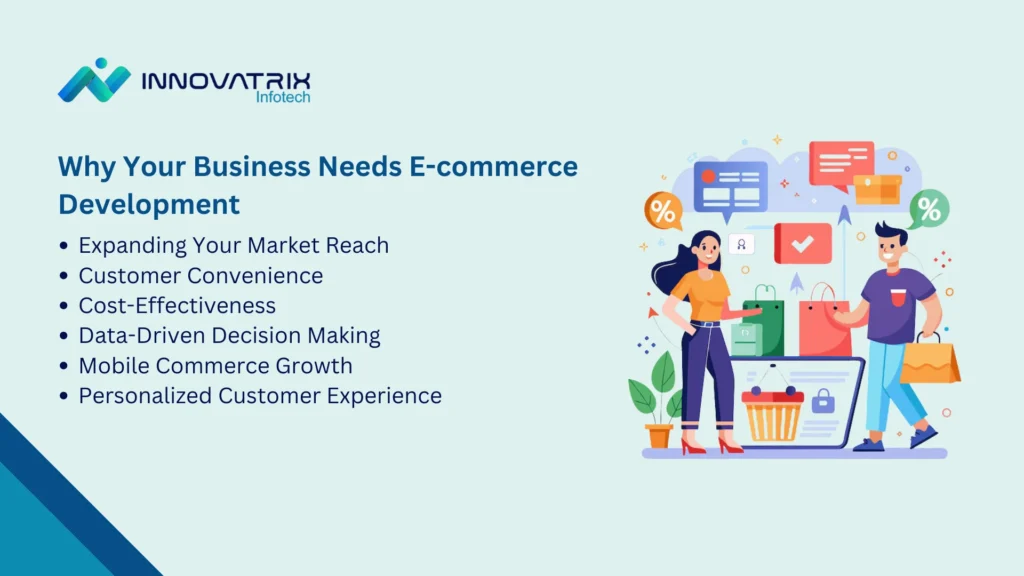
In today’s growing world, e-commerce development is more than a choice due to the advancement in the digital ecosystem. It not only widens the opportunities but also paves the way for traditional businesses to grow. E-commerce platforms enable businesses to sell products and services without being about time constraints and territorial boundaries. The services and products are available at online stores 24/7 with timely delivery. Everything from B2B e-commerce development for enterprise clients to B2C e-commerce solutions focused on customers is now available at your fingertips. Here are the major benefits of e-commerce development:
Expanding Your Market Reach
The e-commerce development ensures that consumers can access online products and services around the clock. Properly customized and responsive e-commerce websites are redefining the realm of business expansion. E-commerce development is nourishing local businesses across the globe in an optimal manner.
Cost-Effectiveness
The economic value of an e-commerce platform is less than running a physical store. The business owner can save on rent, utilities, and staff costs. All these tasks are performed using an automation process like inventory management, order processing, and marketing. Collaboration with e-commerce development agencies tends to ensure smooth working dynamics of e-commerce websites. Moreover, it enables business expansion beyond the horizon and makes the e-commerce marketplace profitable as well.
Data-Driven Decision Making
One of the foremost benefits of e-commerce is the appropriate management of sales data. A popular data-driven decision making tools are Google Analytics that helps businesses track customer behavior, customer retention, and products or services in high demand. Marketing strategies become achievable with data analysis and proper SEO for e-commerce enable businesses to attract wider audience and traffic.
Mobile Commerce Growth
With the rise in e-commerce platforms, mobile commerce also gained viability digitally. Mobile commerce is frequently used by people due to ease of use and better functionality. Buying and selling through responsive websites with multi-device compatibility in e-commerce offers efficient use and accessibility. Mobile commerce can be successfully used through smartphones, tablets, or desktops. However, optimization of mobile commerce is not only about designs but it is more than that. It’s about smooth functionality and multi-device compatibility.
Personalized Customer Experience
The personalized customer experience caters through AI-driven technologies and predictive analytics. With proper analysis of customer data, enterprises can offer product recommendations, marketing notifications, and promotional offers for increasing customer engagements. Prominent personalized B2C e-commerce solutions comprised of targeted emails and ads. These practices not only boost conversions but also enhance brand recognition across all digital platforms.
Essential Components of E-commerce Development
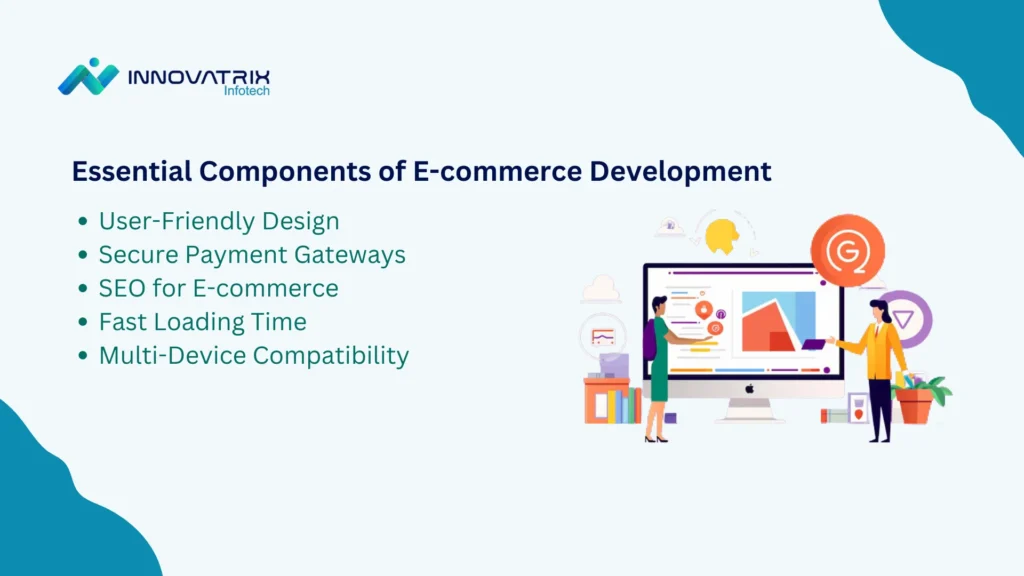
User-Friendly Design
Designs are a prerequisite for shopping on e-commerce platforms; designs that have a tendency to seize the attention of customers tend to grow dynamically. The user-friendly design contains a responsive e-commerce website with an intuitive and captivating layout. The aim is to increase customer retention on e-commerce platforms. Designers need to focus on UX/UI for e-commerce so that customers can have a satisfying experience while browsing and shopping.
If the designs are not able to capture the user’s attention then they will lose the conversion as well. Good design is not just involves aesthetics; it’s about building a companion for customers during the journey from landing page to checkout. When business owners collaborates with e-commerce development agency, then economic growth of the business becomes viable.
Secure Payment Gateways
The most important credentials for e-commerce websites are secure online payments. Building trust is a cornerstone when it comes to online shopping. The major requirement for customers is e-commerce payment gateways that secure personal and financial details. In-built e-commerce payment gateways enable seamless online transaction without the data breaches.
Security also becomes a top-most priority during SEO for e-commerce, as search engines give priority to websites having secure payment options, such as HTTPS protocols, in their rankings process. Moreover, a secure and seamless payment framework that is combined with multi-device compatibility ensure sustainable shopping experience for customers.
SEO for E-commerce
Do you know SEO rules in the world of digital visibility and recognition? Thereby SEO for e-commerce plays a vital role in brand enhancement digitally. Proper search engine optimization enables websites to rank higher on SERPs, consequently driving higher organic traffic. SEO tactics for e-commerce involve the optimization of product descriptions, the creation of meta tags with targeted keywords, and compressing images to speed up loading times. By following these techniques, the enterprise not only gets potential buyers but also large-scale visibility.
Fast Loading Time
Website speed is a powerhouse of sales and customer retention. A slow-loading site can lead to impatience among the user, high bounce rates, and negatively impact conversions. E-commerce websites should primarily focus on image compression, content delivery networks (CDNs), and code minimization. A fast loading time of websites tends to keep users engaged and drive them towards purchasing particular products and services. Hence, by focusing on these parameters, e-commerce websites will grow immensely.
Multi-Device Compatibility
Mobile commerce is increasing the competency in the digital ecosystem. The e-commerce website ensures multi-device compatibility and is frequently used by customers. An e-commerce website that works with ease on desktop, tablet, or mobile has a higher chance of conversions. A mobile-optimized website not only improves user experience but also gives impetus to SEO enhancement. Google’s search engine gives higher priority to SEO-optimized websites. Shopping via mobile devices is in high demand due to accessibility and usability.
How to Get Started with E-commerce Development
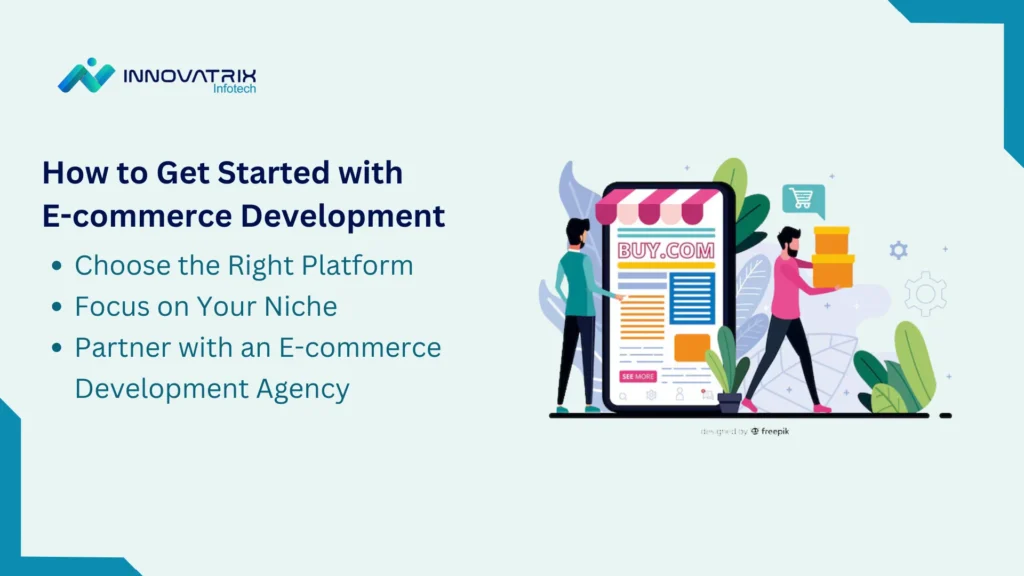
The awareness of the business goals, aspirations, capacity, total investment value, etc., becomes crucial for building e-commerce development. A proper understanding of budgets, niches, unique selling properties, consumers, etc., is necessary for creating an e-commerce platform. Here are the major objectives kept in mind for building an e-commerce marketplace:
Choose the Right Platform
The selection of the right platform to start with e-commerce development. The platform is a fundamental unit for e-commerce development. The success of e-commerce development is majorly dependent on the type of platform. The entrepreneur selects the e-commerce platform that synchronizes with their business needs. The affordable e-commerce platforms for small or medium-sized businesses are Shopify and WooCommerce. Customization features for e-commerce websites are available on platforms like Magento and BigCommerce. Therefore, choose a platform that is compatible with your business needs.
Focus on Your Niche
Focusing on a niche helps a business to outshine the crowded digital marketplace. It enables the business to get an organic audience and makes the business more competitive. The USPs of the businesses aimed at building brand value across the digital ecosystem. The SEO for e-commerce is a primary component for enhancing business by focusing on highly competitive keywords. The business owner should primarily focus on the refinement of products, strong customer relationships, and brand visibility online.
Partner with an E-commerce Development Agency
Partnering with an E-commerce Development Agency helps businesses to flourish tremendously at cost-effective prices. A professional e-commerce agency has experienced staff that can develop a responsive e-commerce website and engross it with multi-device compatibility features. Skilled developers create e-commerce websites that have the ability to get high conversions. In addition, SEO experts at e-commerce development agencies improve search engine visibility. Thereby, brand recognition becomes smooth and seamless.
Conclusion
Convenience, scalability, and customer insights are major dimensions of e-commerce development. The e-commerce platform comes with detailed information about the product, which provides immense trust and saves time for the customer. Why not it would be when time is valuable to everyone. E-commerce platforms are known as wizards for easy payment options and hassle-free return policies. It guarantees an implacable affinity for customer insight and cost reduction. The race is viable, and hitting the dart at the right moment includes growth and staying competitive in the market.
Fed up of physical store? An E-Commerce store is here on your collar with bundle deals and perk of Convenience. Contact Innovatrix Infotech to get your own scalable e-commerce platform.
Get access to Innovatrix Infotech e-commerce development services via email: contact@innovatrixinfotech.com
Mobile phone: +91-7003215657, +91-6283401341

Rishabh Sethia
Rishabh Sethia is an experienced e-commerce developer. With eight-plus years of experience, Rishabh is helping small or medium-sized businesses grow within the digital ecosystem. His knowledge of new updates and technologies in the development domain is helping him build a customer-friendly marketplace.
